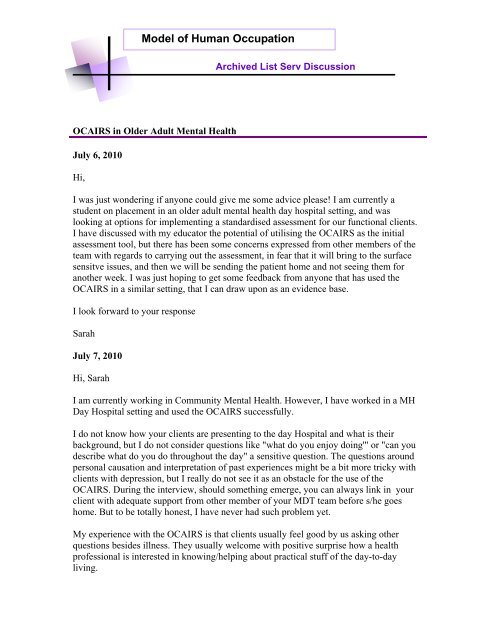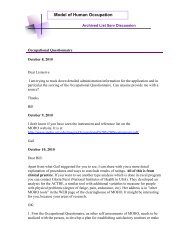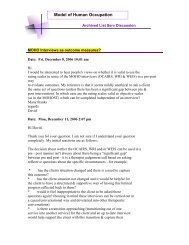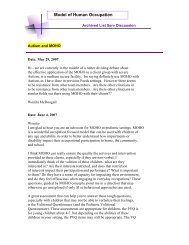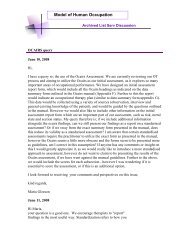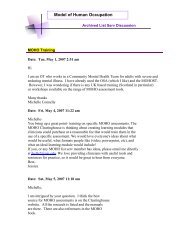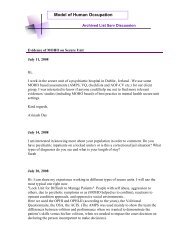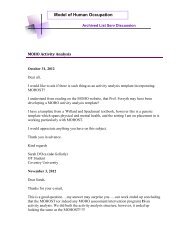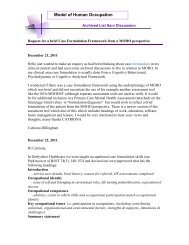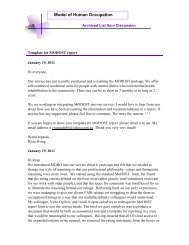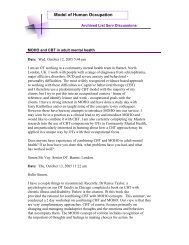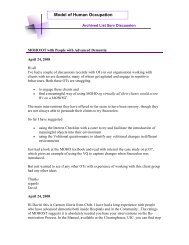OCAIRS in Older Adult Mental Health
OCAIRS in Older Adult Mental Health
OCAIRS in Older Adult Mental Health
Create successful ePaper yourself
Turn your PDF publications into a flip-book with our unique Google optimized e-Paper software.
July 8, 2010Thank you both for your fantastic advice, i'm sure it will put the fellow team membersm<strong>in</strong>ds at restBest wishesSarahJuly 8, 2010Hi Sarah,Three issues raised by your email.Firstly:My experience with <strong>OCAIRS</strong> echos that of Carmen and Rodrigo. Regard<strong>in</strong>g olderadults, an amaz<strong>in</strong>g amount will show a quite a positive response, particularly as theyshare th<strong>in</strong>gs that they have enjoyed <strong>in</strong> the past.Most Clients f<strong>in</strong>d it refresh<strong>in</strong>g to be asked how they th<strong>in</strong>k about th<strong>in</strong>gs and what theymost value; how satisfied they are with their situation and what their goals are. If theyhave trouble with the direct "what do you do <strong>in</strong> a day?" (or say "noth<strong>in</strong>g" - which is<strong>in</strong>f<strong>in</strong>itely more probable than a distressed response); people who I have seen will oftenrespond well to questions about what hours they rise and retire and then an <strong>in</strong>vitation towalk me through/ or share an 'average' day with me.Secondly, for your colleagues, do any other areas not raise sensitive areas? Is cont<strong>in</strong>encenot sensitive? the idea to some of hav<strong>in</strong>g to have a regular <strong>in</strong>jection? Some of thediagnoses the doctors hand people with or without <strong>in</strong>formation? the side effects of themedications taken? Heart disease? Diabetes? degenerative diseases? Heaven forbidsexual dysfunction (at that age)? dementia? deteriorat<strong>in</strong>g sight? falls? F<strong>in</strong>ancialdifficulties? Accommodation difficulties? Relationship issues and families that keeptry<strong>in</strong>g to get people placed? The <strong>in</strong>timate or bizarre th<strong>in</strong>gs that the voices say?The fact that you have psychosis? That you need to see a psychiatrist? the content of yourdelusional system? The frustration that people th<strong>in</strong>k you need a carer when you may feelthat you are <strong>in</strong>dependent and your neighbour enjoys his retirement play<strong>in</strong>g <strong>in</strong> a lawnbowls tornament every other day? The warewolf <strong>in</strong> the shower that is mak<strong>in</strong>g you tooafraid to wash even though you're sick of your own smell?Oh yeah .... I can see how <strong>OCAIRS</strong> raises more sensitive issues than the rest of the teamdoes.Lastly -Part of any good assessment process <strong>in</strong>cludes the practice of ensur<strong>in</strong>g that the client feelssafe throughout the assessment and prior to leav<strong>in</strong>g your session. Surely a cl<strong>in</strong>ical teamneeds to credit the <strong>in</strong>clusion of that skill <strong>in</strong> the adm<strong>in</strong>istration of <strong>OCAIRS</strong> for yourproject.
The OT, and by <strong>in</strong>ference the OT student study<strong>in</strong>g under the supervision of an OTtra<strong>in</strong><strong>in</strong>g you <strong>in</strong> <strong>in</strong>terview skills must have their cl<strong>in</strong>ical skills <strong>in</strong> adm<strong>in</strong>istration of<strong>in</strong>terview <strong>in</strong>cluded when evaluat<strong>in</strong>g these issues regard<strong>in</strong>g use of a cl<strong>in</strong>ical tool.RegardsJacqui NettletonJuly 11, 2010Just to build on Jacqui's response, although not on the <strong>OCAIRS</strong>, this article (us<strong>in</strong>gOPHI-II rather than <strong>OCAIRS</strong>) outl<strong>in</strong>es therapists hesitation <strong>in</strong> ask<strong>in</strong>g questions that youraise, but also consumers positive responses to be<strong>in</strong>g asked questions about their liferather than their illness.Regards, louEnnals, P., & Fossey, E. (2007). The Occupational Performance HistoryInterview <strong>in</strong> community mental health case management: Consumer andoccupational therapist perspectives. Australian Occupational TherapyJournal, 54, 54: 11-21.July 14, 2010Hi Sarah - I realise you have had some great advice (as always) from various cl<strong>in</strong>iciansalready.I just wanted to add my thoughts on the excellent po<strong>in</strong>t Jacqui Nettleton made regard<strong>in</strong>gInterview Skills...it doesn't matter how good the tool is that you are us<strong>in</strong>g - it is alwaysdependent on the cl<strong>in</strong>ician to use it <strong>in</strong> a thoughtful and sensitive manner, and us<strong>in</strong>g it at apo<strong>in</strong>t that is appropriate <strong>in</strong> the therapeutic relationship (particularly <strong>in</strong> mental health).You can also <strong>in</strong>advertently stumble onto a sensitive topic without realis<strong>in</strong>g it <strong>in</strong> generalconversation, but if you are engag<strong>in</strong>g with the <strong>in</strong>dividual you can become aware of thatand can address any issues that arise.When I used to work <strong>in</strong> mental health I occasionally was required to use the BecksDepression Inventory or the Hospital Anxiety & Depression Scale - tools which are verydirect to the po<strong>in</strong>t,and therefore tend to focus on some potentially very distress<strong>in</strong>g aspectsof mental illness. I often forewarned them about the potential emotional experience ofgo<strong>in</strong>g through such an assessment, which more often than not saw the <strong>in</strong>dividual us<strong>in</strong>gtheir own personal resources <strong>in</strong> advance to 'steel themselves up' for the experience (I wasthen able to reflect with them afterwards on how they had done well to manage it etc).It strikes me that your thoughtfulness around the most appropriate assessment tool to use,as well as your consideration over the potential impact of that tool on the <strong>in</strong>dividualdemonstrates the sort of thoughtfulness and sensitivity that is required to engage yourclients <strong>in</strong> any assessment or <strong>in</strong>tervention.I wish you well with your studies, and please feel free to contact me if I haven't madesense. -Claire
July 15, 2010Hi AllI wanted to echo Claire's comments and note a very useful resource regard<strong>in</strong>g <strong>in</strong>terviews.We teach MOHO <strong>in</strong>terviews and <strong>in</strong>terview<strong>in</strong>g as a process, emphasiz<strong>in</strong>g both theimportance of the focus and content of the <strong>in</strong>terview and the process of conduct<strong>in</strong>g the<strong>in</strong>terview and estabish<strong>in</strong>g rapport, demonstrat<strong>in</strong>g empathy and so on dur<strong>in</strong>g the <strong>in</strong>terview.Anyhow the resource for this is a chapter on Interview<strong>in</strong>g <strong>in</strong> Dr. Renee Taylor's book theIntentional Relationship: Therapeutic Use of Self <strong>in</strong> OT, published by FA Davis. Thisbook has the most detailed discussion <strong>in</strong> OT about how to manage the <strong>in</strong>terpersonalaspect of OT and it addresses specific cl<strong>in</strong>ical challenges and situtions, <strong>in</strong>clud<strong>in</strong>gconduct<strong>in</strong>g an <strong>in</strong>terview.I agree with Claire, that no matter how good a tool is...like any tool, it can be used poorlyor well depend<strong>in</strong>g on the skill of the person who is us<strong>in</strong>g it. In the case of the <strong>OCAIRS</strong>, itmeasns thoroughly understand<strong>in</strong>g the theory beh<strong>in</strong>d the <strong>in</strong>terview content and know<strong>in</strong>gthe <strong>in</strong>terview <strong>in</strong>timately and what it is designed to learn a bout a client and it meansth<strong>in</strong>k<strong>in</strong>g deeply about what it means to sit down with a client and talk about his/her lifeand how an impairment is <strong>in</strong>fluenc<strong>in</strong>g it.Evidence suggests that when used well MOHO <strong>in</strong>terviews (and other assessments) can bevery helpful to clients and that they largely experience them positively. This is partlybecause of the focus of the <strong>in</strong>terviews and the desire beh<strong>in</strong>d them to allow clients to th<strong>in</strong>kabout and talk aobut their lives. It is also partly because of the skill of those who use the<strong>in</strong>terview.Gary Kielhofner


